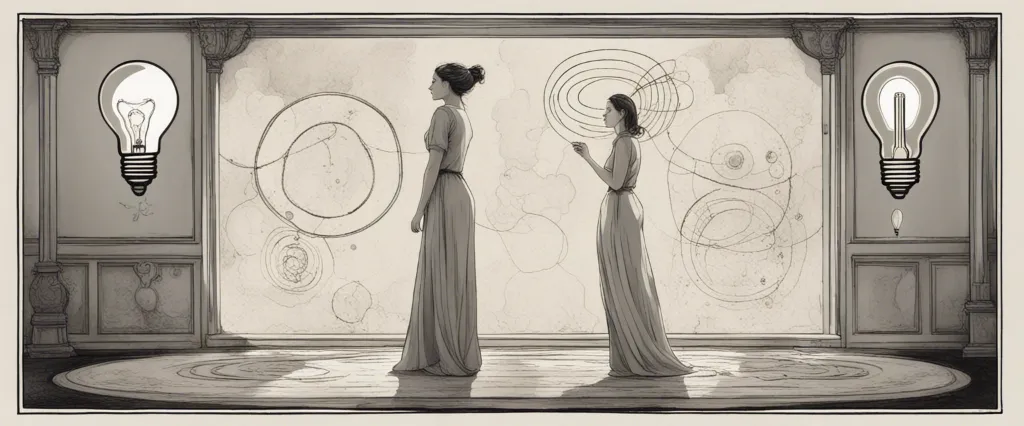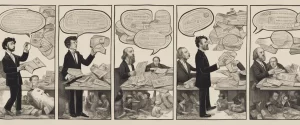——The Charisma Myth by Olivia Fox Cabane & Solve for Happy by Mo Gawdat

In a world where self-improvement and personal growth sit at the forefront of many individuals’ agendas, a vast array of books promise to unlock the secrets to happiness, success, and fulfillment. Two such books that have gained considerable attention in recent years are “The Charisma Myth” by Olivia Fox Cabane and “Solve for Happy” by Mo Gawdat. These works explore the realms of charisma and happiness, espousing unique philosophies and offering practical tools for readers to enhance various aspects of their lives.
The Charisma Myth” delves deep into the enigmatic concept of charisma, debunking the commonly held notion that it is an innate gift bestowed upon a fortunate few. Cabane asserts that charisma can indeed be acquired and cultivated through specific behaviors, body language, and mindset. Drawing from extensive research and personal anecdotes, she guides readers through a step-by-step process of transforming their social presence, communication skills, and emotional intelligence to unleash their charismatic potential.
On the other hand, “Solve for Happy” takes a different approach, focusing primarily on the pursuit of happiness. Mo Gawdat, a former high-ranking executive at Google, shares a unique perspective on finding true and lasting happiness. In this book, he challenges conventional wisdom and society’s entrenched beliefs about what brings us joy, proposing an algorithmic equation that allows individuals to solve for happiness. Gawdat recounts his personal journey through adversity and loss, providing readers with a roadmap to reframe their thinking and achieve a more profound sense of contentment.
Despite their distinct emphases, both Cabane and Gawdat share a common goal: empowering individuals to improve their lives and uncover their true potential. Their respective works offer readers a blend of scientific research, practical exercises, and personal stories, making them accessible and relatable to a wide audience.
In this comparative study, we will delve deeper into the principles, methodologies, and underlying theories presented in “The Charisma Myth” and “Solve for Happy.” By examining these books side by side, we aim to explore the strengths and weaknesses of their approaches, identify key similarities and differences, and ultimately assess which resonates more profoundly with readers seeking personal transformation.
Through this comparative analysis, we hope to shed light on the various aspects of charisma and happiness addressed in these books, enabling readers to choose the most suitable path towards their own self-improvement and fulfillment. Join us on this enlightening journey as we navigate the landscapes of charisma and happiness, uncovering the wisdom and practical insights that lie within the pages of “The Charisma Myth” and “Solve for Happy.”
Brief Summary of Two Books
The Charisma Myth by Olivia Fox Cabane
The Charisma Myth” by Olivia Fox Cabane is a self-help book that explores the concept of charisma and provides practical techniques to develop and enhance one’s personal magnetism. The author argues that charisma is a skill that can be learned and mastered by anyone, regardless of their personality or background. Cabane breaks down charisma into three main components: presence, power, and warmth.
The book begins by debunking common myths surrounding charisma and explaining how it is not an innate quality but a set of behaviors that can be cultivated. Cabane then delves into the concept of presence, emphasizing the importance of being fully engaged in the present moment. She provides various techniques such as mindfulness and relaxation exercises to help readers develop a stronger presence and exude confidence.
The next section focuses on power, which Cabane defines as the ability to influence others. She explains different power cues, body language techniques, and vocal exercises to help readers appear more assertive and influential. Cabane also emphasizes the importance of mindset and self-belief in projecting power.
The final component, warmth, explores the importance of connecting with others on an emotional level. Cabane provides strategies to display empathy, active listening, and genuine interest in others, thereby creating stronger relationships and enhanced charisma. She also addresses common social anxieties and offers techniques to overcome them.
Throughout the book, Cabane supports her teachings with scientific research and real-life anecdotes, making the concepts relatable and practical. With a focus on developing charisma in various contexts, such as business, relationships, and public speaking, “The Charisma Myth” offers readers actionable advice on becoming more charismatic individuals.
Solve for Happy by Mo Gawdat
“Solve for Happy” by Mo Gawdat is a self-help book that explores the path to finding true happiness amidst life’s challenges. The author, an engineer and former Chief Business Officer at Google X, shares his personal journey of overcoming loss and grief after the sudden death of his son. Gawdat presents a unique mathematical equation for happiness, asserting that by adopting a positive mindset and understanding the illusions and misconceptions that hold us back, we can achieve genuine happiness. He challenges common beliefs and societal norms, emphasizing the importance of shifting our focus from external circumstances to internal attitudes. Through scientific research, philosophical insights, and personal experiences, Gawdat provides practical tools, techniques, and perspectives to help readers reframe their understanding of happiness and implement positive changes in their lives. Ultimately, “Solve for Happy” encourages readers to take charge of their own happiness and create a more fulfilling and joyful existence.
Comparison between Two Books

Similarities in Positive Thinking
The parallel between “The Charisma Myth” by Olivia Fox Cabane and “Solve for Happy” by Mo Gawdat lies in the significance they both place on positive thinking. While the books explore different aspects of personal growth and happiness, they touch upon the power of positive thinking as a tool for transformation and betterment.
In “The Charisma Myth,” Cabane emphasizes the role of positive thinking in building charisma. She suggests that adopting a positive mindset not only improves one’s overall well-being but also enhances social interactions. Cabane argues that by reframing negative thoughts, individuals can cultivate a more optimistic outlook and radiate positivity, thus attracting others towards them. This aligns with the concept of positive thinking, which entails consciously focusing on positive thoughts and emotions to reshape one’s mindset and demeanor.
Similarly, in “Solve for Happy,” Gawdat delves into the pursuit of happiness and offers a formula to attain it. Central to his approach is the idea that positive thoughts can directly affect one’s level of happiness. Gawdat encourages readers to reframe negative thoughts into positive ones, acknowledging the importance of mindset in shaping our experiences. By choosing to focus on positive aspects of life, he argues, individuals can elevate their overall happiness and well-being.
Both authors recognize that positive thinking is not about ignoring or denying negative aspects of life, but rather about consciously choosing a constructive perspective. They emphasize the power of thoughts in shaping our reality and encourage readers to actively cultivate a positive mindset to unlock personal growth, happiness, and success.
In summary, “The Charisma Myth” and “Solve for Happy” concur on the significance of positive thinking as a transformative tool. Cabane and Gawdat emphasize the importance of reframing negative thoughts, fostering optimism, and consciously choosing a positive mindset to enhance personal well-being and achieve desired outcomes in life.
Divergences in Positive Thinking
The Charisma Myth by Olivia Fox Cabane and Solve for Happy by Mo Gawdat are two books that delve into different aspects of personal development and happiness. While both touch upon the importance of positive thinking, there are notable divergences in how they approach this concept.
In The Charisma Myth, Cabane explores how charisma can be developed by anyone, regardless of their background or personality. One key element she emphasizes is the power of positive thinking. Cabane argues that having a positive mindset helps in building and maintaining charisma. She suggests that replacing negative thoughts with positive ones can transform an individual’s internal state, leading to improved interactions and overall charisma.
On the other hand, Solve for Happy takes a more holistic approach towards happiness. Gawdat, a former Chief Business Officer at Google X, shares his personal journey to finding happiness after the tragic loss of his son. Although positive thinking is recognized as an important aspect in achieving happiness, Gawdat argues that happiness does not solely depend on positive thoughts. He highlights the importance of accepting and embracing all emotions, positive or negative, as part of the human experience. Gawdat believes that chasing perpetual positivity is not a sustainable way to happiness, as it negates the reality of life’s challenges and the need for growth through such experiences.
The divergence lies in the degree to which the authors prioritize positive thinking in their overall philosophy. The Charisma Myth places significant emphasis on positive thinking as a means to develop personal magnetism and enhance social interactions. Cabane argues that positive thinking can transform one’s mindset and consequently, influence one’s outward demeanor.
On the other hand, Solve for Happy acknowledges the importance of positive thinking but emphasizes that happiness is not solely dependent on it. Gawdat promotes the idea that acknowledging and accepting the full range of emotions, including the negative ones, is crucial for genuine happiness. He believes that resilience, wisdom, and genuine self-reflection are far more powerful tools on the path to happiness than simply trying to think positively.
In conclusion, while both The Charisma Myth and Solve for Happy touch on positive thinking, they diverge in their perspectives on its role in personal development and happiness. Cabane emphasizes the transformative power of positive thinking to enhance charisma and social interactions. Gawdat, in contrast, believes that genuine happiness comes from acknowledging and embracing all emotions, rather than solely focusing on positive thoughts.

Conclusion
Both The Charisma Myth by Olivia Fox Cabane and Solve for Happy by Mo Gawdat are highly praised books that offer unique insights and valuable lessons. Ultimately, the decision of which book is more worthy of reading depends on your personal preferences and what you hope to gain from reading.
The Charisma Myth explores the concept of charisma and provides practical techniques for developing self-confidence, enhancing communication skills, and building strong relationships. It delves into strategies for becoming a more effective and persuasive leader. If you are interested in improving your interpersonal skills and understanding the power of charisma, this book may be the better choice for you.
On the other hand, Solve for Happy takes a different approach by focusing on finding happiness in life. Mo Gawdat, a former Google executive, shares his personal journey and presents a formula for sustainable happiness, based on logic and scientific principles. If you are seeking a deeper understanding of happiness and a practical framework to achieve it, this book may resonate with you.
Consider your current interests, goals, and what you are looking for in a book. Both The Charisma Myth and Solve for Happy have their own merits and can be valuable reads depending on your individual needs.


